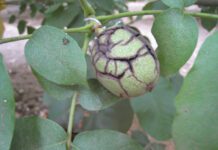
Growers of tree nuts or other orchard crops can naturally reduce rodents in their orchard by building nest boxes to foster and maintain barn owls.
Barn owls are fierce predators of many rodent species, including mice, gophers, voles and rats, according to a UC ANR blog post by UCCE Farm Advisor Rachael Long, and can be identified by their white heart-shaped faces, white chests and tan-colored backs with spots. A family of five barn owls, which includes two adults and three young, will feed on 1,000 rodents per season, making them a viable option for natural control, Long said.
However, even if rodents are present in an orchard, barn owls will not consistently hunt them unless there are sufficient nesting sites available. Barn owls are cavity nesters, according to Long, meaning they actively seek out small crevices or holes to nest in. Thus, nest boxes are perfect for attracting and maintaining barn owls.
Nest boxes should be mounted 10 feet above the ground on metal poles to prevent any predator interference. Paint boxes white to keep them cooler and prevent weather damage, and face them northeast, Long said. Wooden boxes are preferred by barn owls, and proper bedding, such as timothy hay, is necessary. Resources for building nest boxes can be found online.
Long said growers in California have been finding success with barn owls. Ray Yeung, a pistachio grower in the Sacramento Valley, maintains barn owl populations in his orchards for gopher control and has seen good results.
“I don’t see them [eating them], but I do see the evidence,” Yeung said. “We sterilize the soils and put herbicides on the ground so that they [gophers] are easier to see [and hunt].”
As for incorporating nest boxes, Yeung has found the process to be simple. “I contacted a guy that made boxes and we bought a bunch of them,” he said. “It’s a relatively simple process. You just put the boxes up and they [the owls] come.”
Decreased damage to trees and irrigation systems as well as reduction or elimination of rodenticides contribute to lower management costs with barn owl boxes. Additionally, barn owls are free to keep in the orchard, but make sure to maintain and clean nest boxes in the offseason by removing owl pellets. Barn owls do not migrate and will return the following year, according to Long.
















